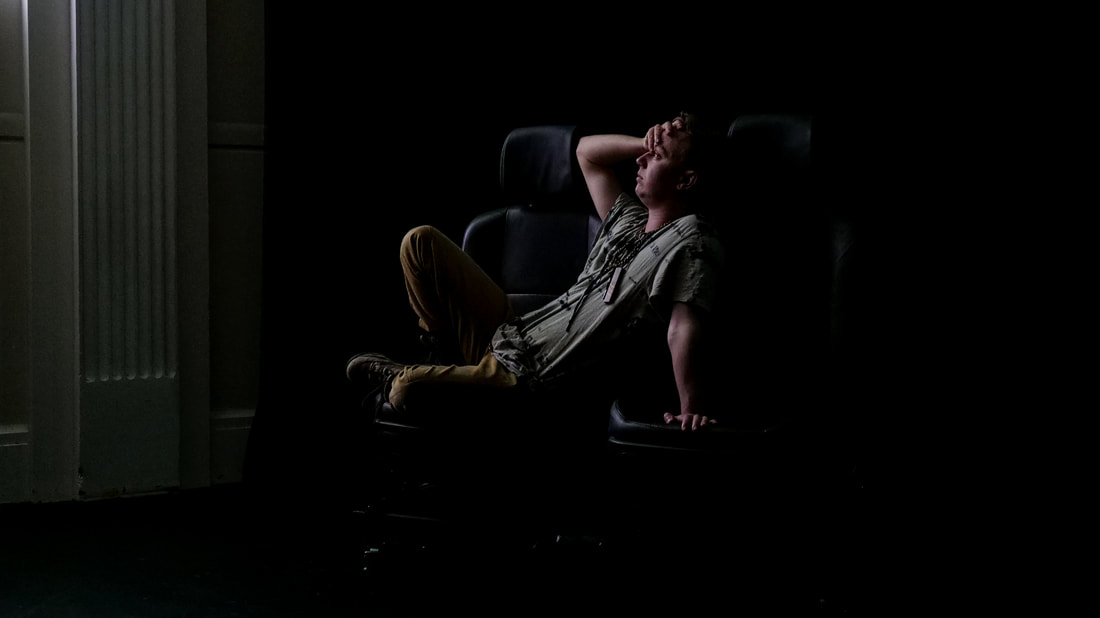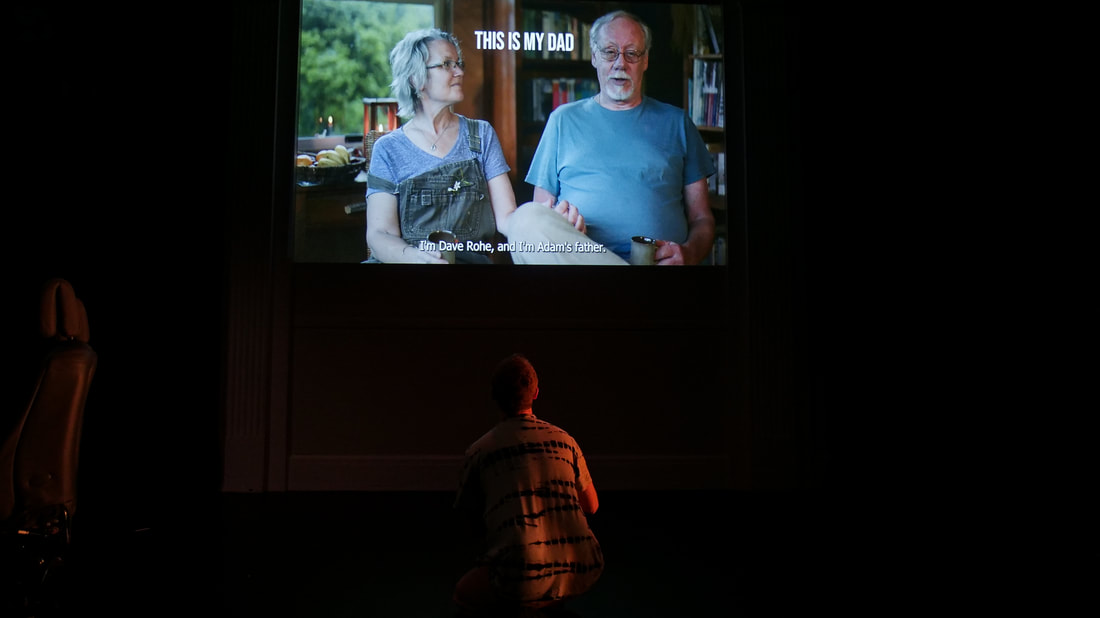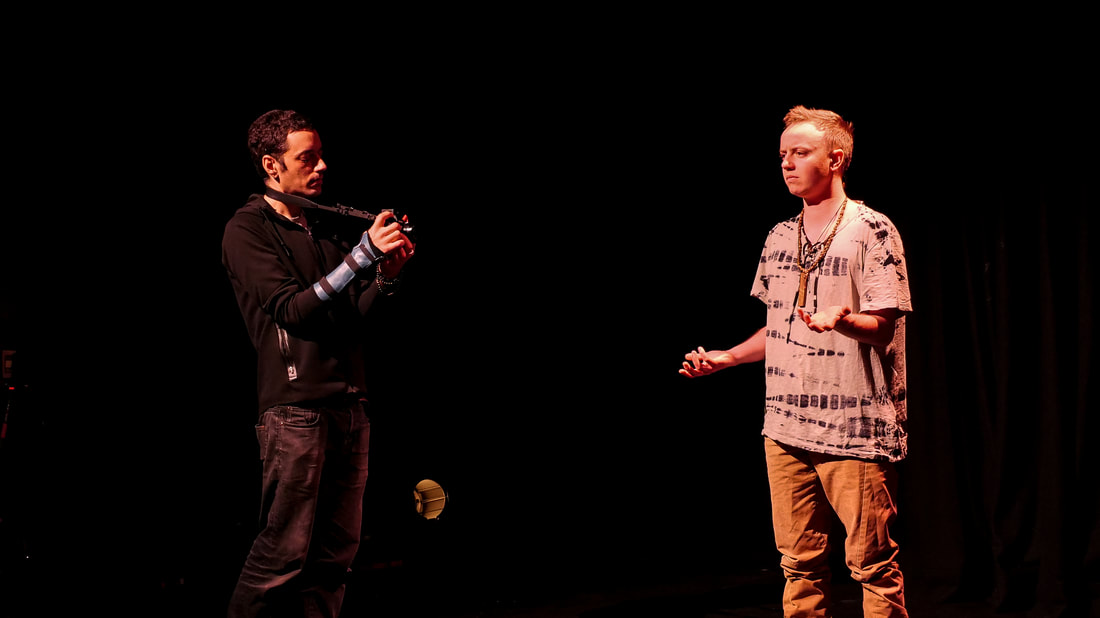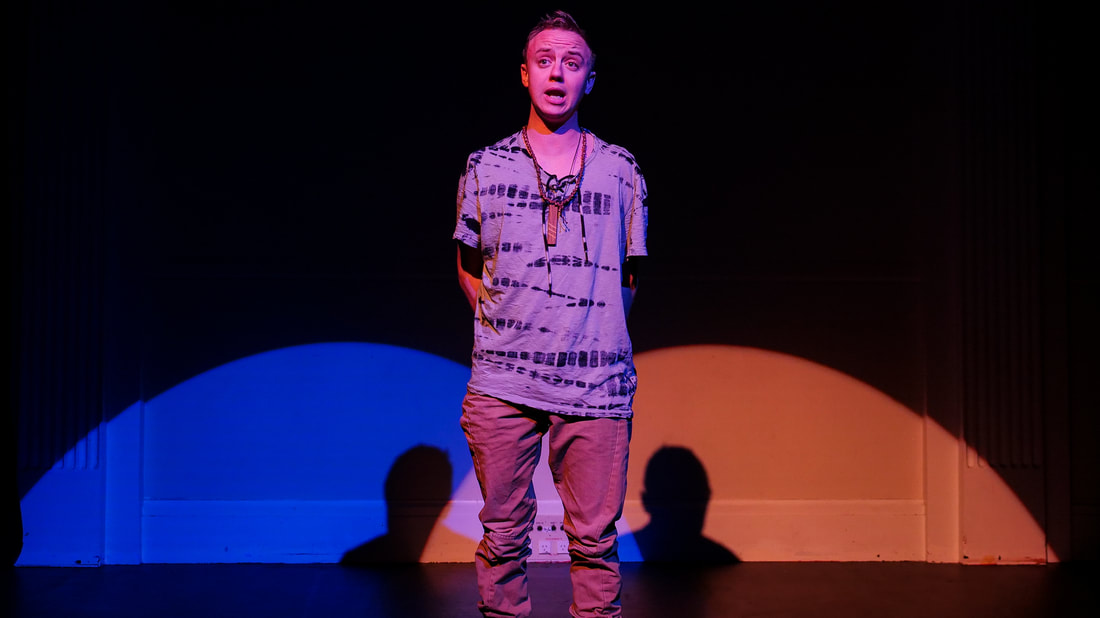Emilie Hope
Rohe is made vulnerable by performing this powerful show. It truly gives great insight into his trans experience. There are some delightful people in his life. I especially love that his father is “always interested in what I think”, which is such a wonderful characteristic to have in a father. His mother “brings la fiesta” and just by saying those words alone (not only did it make me laugh out loud), I feel like I already know her. Sarten’s observational style of filmmaking really helps us dive into this story without thinking these people on screen are characters. Mixing this with live performance and live recording (Starten is recording as Rohe is performing live) is truly a new kind of experiment, one I am deftly intrigued by and encourage further exploration of. Few shows have done it, much less this successfully and interwoven, and so I wonder if there are other boundaries in which these two mediums could break together. I leave this to the creators of Man Lessons.
However, the framing of the show is one thing I can’t quite wrap my head around. Rohe states he won’t have this show be the razzle-dazzle of what we expect in theatre – he is trying to be honest rather than interesting. Yet, we still have some simple but effective lighting – it is, after all, a theatre show. I feel to avoid the glitz and glamour of theatre is to not perform within the confines of the black box framework. For example, if Man Lessons is performed outside in the sunlight in an amphitheatre, it would feel more naturally honest for many reasons, one of which being that the show would be much more exposed, both for the performer and for the audience. But then again, does ‘exposure’ necessarily equal honesty? At one stage, we did have some soft lights on the audience, indicating the show understands the magic of live performance, the key relationship of which is that between the performer and the audience, but this is short-lived, only occurring towards the beginning of the show.
I think this comment at the top of the show about the difference between being honest and being interesting is what has thrown me through a loop here. There’s an implication that Rohe sees some theatre as not honest, and I cannot agree with this: I have seen too many shows that are works of fiction yet are incredibly honest and impactful. Then again, there have been other shows which have lacked the ability to dive deeply into the ugly core of a subject and therefore remains surface-level interesting. I think Rohe wants to avoid Man Lessons falling into the category of the latter, but I can reassure him that there is nothing to worry about on that front. Man Lessons is exquisite for diving deep and examining this emotionally muddled journey. However, there then is an added layer of complexity with the film – are we meant to view this as more honest than the live performance? In some ways, it is (mostly because of Sarten’s excellent fly-on-the-wall style of filming), because it captures something in a particular time and place in Rohe’s life that he will not be able to recreate in a live performance setting.
Later, when Rohe seems shocked and disturbed by his past self as presented on film and Sarten asks some questions like “How do you think the show is going?”, Rohe answers looking at the camera (or Ben), not at us, the audience. This takes me out of the world of the theatre. I don’t doubt the emotions behind this section, but rather the frame in which they are presented to the audience. It suddenly feels like the show isn’t for us, but rather to serve the documentary. Reflecting honestly about how he’s feeling in this moment, after seeing his past self, to the audience is something that works in a live performance setting. Man Lessons is certainly trying to get to grips with the past, and is conscious of the future as it is being recorded live by Sarten – this is especially true when Rohe wonders about what his future self “is going to notice what this [current] me is missing.” Man Lessons feels uncomfortable, however, with sitting in the now. In the now in this theatre space with these live audience members. When he asks questions to the audience, they are rhetorical, which makes me wonder what would happen if they weren’t, if there is slightly more involvement of the audience with the show. What further magic could be made if the audience is included more, rather than being a simple spectator for the live show as well as the documentary? It feels like the show is uncertain about its framework and why it needs to be a theatre piece specifically.
I want to be clear: the content of Man Lessons is amazing, powerful, and so needed. I would like the creators of the live show – Rohe himself, dramaturg Eve Gordon, and live show co-deviser Neenah Dekkers-Reihana – to think more about the frame in which the show sits and how it can give equal weight to the live performance and to the documentary.
In the programme, Gordon states “I don’t really know why Adam is choosing to share his story with us, but this show is a gift…” and I agree entirely with the second part of that statement. As for the first part, I feel Rohe’s reasons for sharing his story is one that reflects the truly resilient nature of queer culture. We share stories about ourselves so others can see us – both those who are not like us and those who are. In an interview with his younger self as projected on the back wall of the theatre, this virtue is strong within Rohe. He wants to make it easier for other trans kids to see themselves. Man Lessons is a gift, a complex diamond of a show that I hope inspires more trans folx to be themselves, and perhaps to share their stories with family, friends, and (if they want) to complete strangers from a stage. Why does Rohe share with us his story? Because he’s an artist, and we always share parts of ourselves with the world – that is the nature of being an artist. I am incredibly grateful Rohe is sharing with us such a personal part of his life and would be intrigued to see how the show develops over time as the documentary is made.
Man Lessons is a story of becoming yourself and facing the terrifying existential questions around that. I feel like society views life in stages, that by the time you’re in adulthood, you should have grown up by then. We are always growing, and never have I seen a show that so accurately yet uniquely depicts what it feels like to be an adult and grow. I strongly recommend this show to everyone and implore you to see it before it wraps up on the 20th of August.










